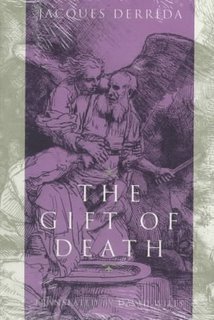
The Gift of Death by Jacques Derrida
So, I have been reading this late work by Jacques Derrida recently. It was recommended to me by Joan whom I studied with at Otis. She said it was the best work by him. I wasn't sure what to expect, but decided to give it a go.
This book is amazing. Here is what Publishers Weekly has to say...
French philosopher Derrida stares death in the face in this dense but rewarding inquiry. Beginning with an analysis of an essay on the sacred by Czech philosopher/human rights activist Jan Patocka, Derrida follows the development of moral and ethical responsibility, and the concept of the soul's immortality, in the transition from Platonism to Christianity. He then ponders the self's anticipation of death in sacrifice, war, orgiastic mystery cults, murder and execution, with reference to Kierkegaard's Fear and Trembling, Nietzsche, Heidegger's thought (a "constant attempt to separate itself from Christianity") and the biblical story of Abraham's contemplated sacrifice of his son, Isaac, at God's behest. In the most provocative section, Derrida links religious injunctions of sacrifice to the "monotonous complacency" of modern society, which allows tens of millions of children to die of hunger and disease.
I admit that Chapters One (Secrets of European Responsibility) and Two (Beyond: Giving for the Taking, Teaching and Learning to Give, Death) were fairly easy to read and quite enthralling. Concepts dealing with responsibility and European heritage are fully detailed from the originary Heretical Essays in the Philosophy of History by Jan Patočka. But, Chapter Three (Whom to Give to: (Knowing not to Know)) was a stunner. After four rereadings Derrida's subtle deconstruction started to become clearer. It helps to hold two opposing views in mind simultaneously. As for the final Chapter (Tout autre est tout autre), I think ten more readings of it will help. I'll get back to you on how it goes.
In the meanwhile, here is a fantastic essay by Ivan Chvatík titled The Heretical Conception of the European Heritage in the Late Essays of Jan Patočka. Here is Chvatík's abstract of the essay:
In this short piece I am not undertaking to give a full discussion of the whole of Patočka’s ‘heretical’ work. I wish only make clear its most essential core. What, in Patočka’s view, made Europe Europe and what is Europe’s bequest to the world after what Patočka describes as its fall, completed by the two world wars? What should Europe look to conserve in itself if—as seems likely—it would like to once again play a respected role in world events? Is there something which the globalised world should take over from old Europe, or something which it should eschew, if it does not wish history to end and utter decadence to ensue?
No comments:
Post a Comment